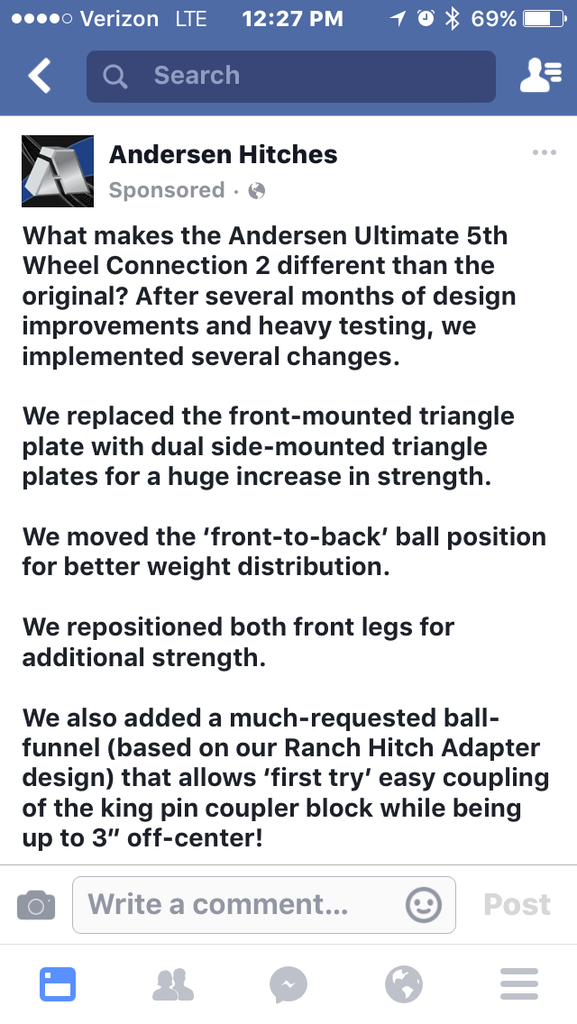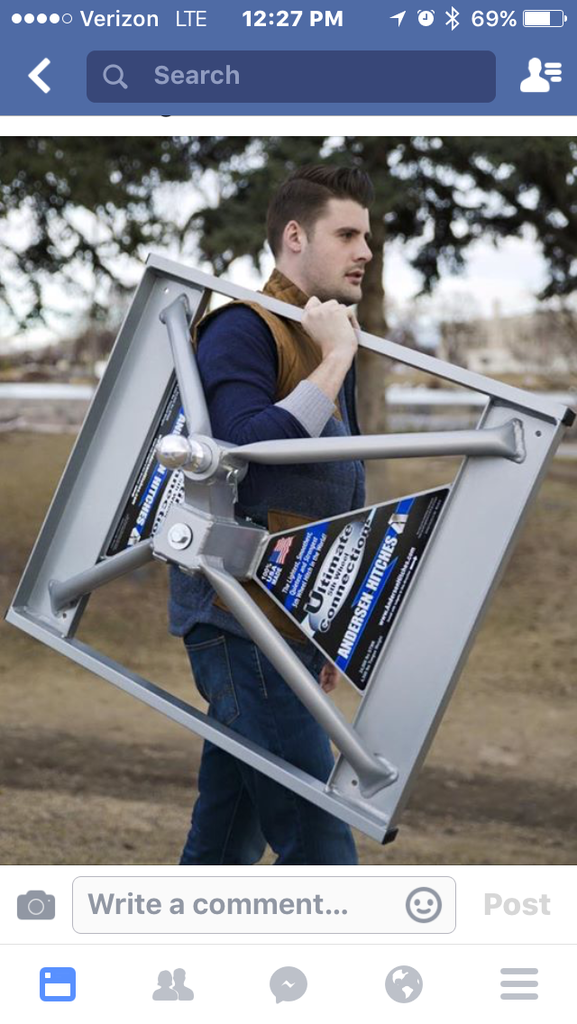Forum Discussion
- ralphnjoannExplorer
Bobandshawn wrote:
Rail version of which hitch? When i figure hitch weight I am figuring everything needed. Frame adapter if used, floor ball if used, safety chains etc. All of these are very lightweight compared to a regular hitch. What is real funny to me is how you hear very few flamers flame the Pullrite Superlite hitch. I guess it's okay and possibly won't kill children.
Andersen rail mount. - BobandshawnExplorerRail version of which hitch? When i figure hitch weight I am figuring everything needed. Frame adapter if used, floor ball if used, safety chains etc. All of these are very lightweight compared to a regular hitch. What is real funny to me is how you hear very few flamers flame the Pullrite Superlite hitch. I guess it's okay and possibly won't kill children.
- ralphnjoannExplorer
minnow wrote:
Bobandshawn wrote:
I like the Pullrite design. It's probably 100
Lbs heavier which I don't like. But the funnel is cool.
The Pullrite site say's the hitch weighs 53 lbs. A little heavier than the Andersen Ultimate at 35 lbs. but lighter than the Andersen steel version which weighs in at 75 lbs.
Andersen now also offers their version of the funnel too.
My rail mount version weighs 43 pounds. - BobandshawnExplorerI remember back in the early 70's my dad got his first 5th wheel. They were fairly new back then. His hitch, a Holland I believe, was a 4' wide piece of heavy channel iron with the 5th wheel welded to it. It articulated between two brackets bolted to the fender wells with 7/16" bolts. My brother and I put some brace plates in to tie it to the truck frame. His second 5'er used a reverse 5th wheel hitch. They bolted a huge 5/15" thick plate to the floor of the truck (and into the frame) and it had a turn over pin like what you see on the pin box in the center. This seemed much better. Both hitches really lacked much articulation if he was on uneven ground. Many times depending on what company you got your trailer from depended on what hitch you would use. His second hitch, the reverse 5th wheel hitch, came with the Holiday rambler. Lift trailer, back truck up till trailer hitch almost hits the aux fuel tank, lower trailer, drive forward to hitch up. that design didn't work out I guess! But he towed that Rambler all across the country and through a lot of Canada. F250 with a 360 gas and C6 trans. He just about ran over my mom's foot many a time as she was looking over the side of the bed so he wouldn't hit the aux fuel tank. LOL
- SabreCanuckExplorer
shepstone wrote:
This is how I see it. Regardless of how the event occurred whether it was human error or mechanical failure, the unit failed under an extreme braking instance where there was no impact. If there had been an impact after the extreme braking ,and the unit had already failed because of the extreme braking, then at that point the outcome would be worse than with an unfailed unit of any manufacturer. Feel free to correct me if I am wrong.
It would be my opinion that you are wrong. It didn't FAIL. It was damaged.
Example: There very well could have been cupboards or contents inside the camper that were damaged as well but we aren't bashing the trailer manufacturer.. Where is the difference? - WTP-GCExplorer
shepstone wrote:
This is how I see it. Regardless of how the event occurred whether it was human error or mechanical failure, the unit failed under an extreme braking instance where there was no impact.
That's a flawed way of thinking. You can't put human error and mechanical failure in the same category. Even the best piece of equipment is a piece of junk and will fail if you factor in enough human error. - shepstoneExplorerThis is how I see it. Regardless of how the event occurred whether it was human error or mechanical failure, the unit failed under an extreme braking instance where there was no impact. If there had been an impact after the extreme braking ,and the unit had already failed because of the extreme braking, then at that point the outcome would be worse than with an unfailed unit of any manufacturer. Feel free to correct me if I am wrong.
- rhagfoExplorer III
Cummins12V98 wrote:
"The additional "weight" transferred to the bed is the rotational force applied when starting/stopping. The main hold-down pin and under-frame mount still carries the majority of the weight. Think about why most of us won't use a GN adapter because of the extra stresses on the FW frame. Now, raise the hitch point up into the same plane as our FW hitches and that rotational force has to go somewhere, and that's to the bed. The pin still carries the weight, as I keep saying, the bed picks up the stresses from the rotational forces.
FWIW, I just emailed B&W and we'll see what =they= say about it. :-)
Lyle "
B&W would not have supplied me with two plastic strips to be used as spacers between the bottom of the hitch base and the low bed corrugation to transfer the load to the bed cross members if there was not a problem. The base sitting on the bed is the only thing keeping the hitch head mostly stationary same for the Ultimate.
The ball mount carries zero weight!! That is true for both the B&W and Andersen! The draw down bolt tighten to some where in the area of 40 lb. ft. Puts an upward pull on the ball adapter. The bed carries ALL of the weight of the pin! - IdaDExplorer
SabreCanuck wrote:
May I suggest for those discussing the detriment affects of the Anderson Hitch applying too much pressure on the truck bed that you do have the ability to order the Ultimate Hitch version that mounts on pre-existing 5th wheel rails.
Ultimate Rail Version
Which to my un-educated mind would be the same stress points all of us already have on our regular fifth wheel hitches..
:W
Just my opinion but I use the rail version and think it's a better setup than any of the turnover ball style hitches that sit on the bed (Andersen or B&W). Just seems like more solid to me, and you have the flexibility of using any other rail mounted hitch, including a regular gooseneck ball with one of the rail mounted conversion kits. So you're covered for cheap if you've got a gooseneck utility trailer or livestock trailer.
The only downside is the rails in the bed but that's a pretty easy thing to work around. - SabreCanuckExplorerMay I suggest for those discussing the detriment affects of the Anderson Hitch applying too much pressure on the truck bed that you do have the ability to order the Ultimate Hitch version that mounts on pre-existing 5th wheel rails.
Ultimate Rail Version
Which to my un-educated mind would be the same stress points all of us already have on our regular fifth wheel hitches..
:W
About Fifth Wheel Group
19,006 PostsLatest Activity: Feb 18, 2025

